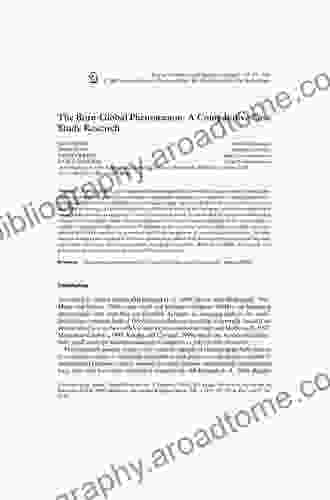Psychological Implications for Democracy in a Global Context

Democracy is a complex and fragile political system that requires the active participation of its citizens. In a globalized world, democracy faces a number of challenges, including the rise of authoritarianism, the spread of misinformation, and the erosion of trust in institutions.
5 out of 5
| Language | : | English |
| File size | : | 633 KB |
| Text-to-Speech | : | Enabled |
| Enhanced typesetting | : | Enabled |
| Word Wise | : | Enabled |
| Print length | : | 207 pages |
Psychology can play a vital role in understanding the psychological implications of these challenges and in developing strategies to address them. This guide provides a comprehensive overview of the psychological implications of democracy in a global context. It examines the role of psychology in understanding the challenges and opportunities facing democracy today.
The Importance of Psychology for Democracy
Psychology can help us to understand the psychological factors that contribute to democratic values and behaviors. For example, research has shown that people who are high in empathy and trust are more likely to support democratic values and to participate in democratic processes.
Psychology can also help us to understand the psychological barriers to democracy. For example, research has shown that people who experience social and economic deprivation are more likely to support authoritarian leaders and to reject democratic values.
By understanding the psychological factors that contribute to and hinder democracy, we can develop more effective strategies to promote democracy and to protect it from threats.
The Challenges Facing Democracy in a Global Context
Democracy faces a number of challenges in a globalized world, including the rise of authoritarianism, the spread of misinformation, and the erosion of trust in institutions.
The rise of authoritarianism. In recent years, there has been a rise in authoritarianism around the world. This trend is particularly concerning because authoritarian leaders are often hostile to democratic values and institutions. They may suppress dissent, restrict freedom of the press, and undermine the rule of law.
The spread of misinformation. The spread of misinformation is another major challenge facing democracy. Misinformation can be used to deceive voters, to undermine trust in institutions, and to promote violence. In a globalized world, misinformation can spread quickly and easily through social media and other online platforms.
The erosion of trust in institutions. Trust in institutions is essential for the functioning of democracy. However, trust in institutions has been eroding in recent years. This is due to a number of factors, including the rise of populism, the spread of misinformation, and the perceived failure of institutions to address the needs of citizens.
The Role of Psychology in Addressing the Challenges Facing Democracy
Psychology can play a vital role in addressing the challenges facing democracy. Psychologists can help us to understand the psychological factors that contribute to the rise of authoritarianism, the spread of misinformation, and the erosion of trust in institutions. They can also develop strategies to address these challenges and to promote democracy.
For example, psychologists can develop educational programs to teach people how to identify and resist misinformation. They can also work with journalists to develop more effective strategies for communicating accurate information to the public. Psychologists can also work with policymakers to develop policies that promote trust in institutions and that address the needs of citizens.
Democracy is a complex and fragile political system that requires the active participation of its citizens. In a globalized world, democracy faces a number of challenges, including the rise of authoritarianism, the spread of misinformation, and the erosion of trust in institutions.
Psychology can play a vital role in understanding the psychological implications of these challenges and in developing strategies to address them. By understanding the psychological factors that contribute to democracy and by developing strategies to address the challenges facing democracy, we can help to build a more just and equitable world.
5 out of 5
| Language | : | English |
| File size | : | 633 KB |
| Text-to-Speech | : | Enabled |
| Enhanced typesetting | : | Enabled |
| Word Wise | : | Enabled |
| Print length | : | 207 pages |
Do you want to contribute by writing guest posts on this blog?
Please contact us and send us a resume of previous articles that you have written.
 Book
Book Novel
Novel Page
Page Chapter
Chapter Text
Text Story
Story Genre
Genre Reader
Reader Library
Library Paperback
Paperback E-book
E-book Magazine
Magazine Newspaper
Newspaper Paragraph
Paragraph Sentence
Sentence Bookmark
Bookmark Shelf
Shelf Glossary
Glossary Bibliography
Bibliography Foreword
Foreword Preface
Preface Synopsis
Synopsis Annotation
Annotation Footnote
Footnote Manuscript
Manuscript Scroll
Scroll Codex
Codex Tome
Tome Bestseller
Bestseller Classics
Classics Library card
Library card Narrative
Narrative Biography
Biography Autobiography
Autobiography Memoir
Memoir Reference
Reference Encyclopedia
Encyclopedia Phil Chalmers
Phil Chalmers Eugene Passofaro
Eugene Passofaro Magno Urbano
Magno Urbano R Key Dismukes
R Key Dismukes Kathryn Wood Madden
Kathryn Wood Madden Erick Stack
Erick Stack Susan Paget
Susan Paget F Alan Goodman
F Alan Goodman Fernando L Arbona
Fernando L Arbona Eric Reese
Eric Reese Mary Potter Kenyon
Mary Potter Kenyon Romano Guardini
Romano Guardini Evelyn Hunt Ogden
Evelyn Hunt Ogden Eugenie Fernandes
Eugenie Fernandes Eugene Y Park
Eugene Y Park Fletcher Kovich
Fletcher Kovich Shirley J Davis
Shirley J Davis Florence Meleo Meyer
Florence Meleo Meyer Gesunder Geist
Gesunder Geist Erik Smith
Erik Smith
Light bulbAdvertise smarter! Our strategic ad space ensures maximum exposure. Reserve your spot today!

 J.R.R. Tolkien1222 Phrases To Learn German And Grow Your Vocabulary In The Easiest And Most...
J.R.R. Tolkien1222 Phrases To Learn German And Grow Your Vocabulary In The Easiest And Most... Banana YoshimotoFollow ·3.5k
Banana YoshimotoFollow ·3.5k Ezekiel CoxFollow ·5.2k
Ezekiel CoxFollow ·5.2k Pat MitchellFollow ·2.3k
Pat MitchellFollow ·2.3k Phil FosterFollow ·19.2k
Phil FosterFollow ·19.2k D'Angelo CarterFollow ·5k
D'Angelo CarterFollow ·5k Carlos DrummondFollow ·8.7k
Carlos DrummondFollow ·8.7k Marcus BellFollow ·7.7k
Marcus BellFollow ·7.7k Quincy WardFollow ·6.5k
Quincy WardFollow ·6.5k

 Troy Simmons
Troy SimmonsStories From The Life Of Baha: A Must-Read For Spiritual...
Discover the Inspiring Teachings and Enriching...

 Wesley Reed
Wesley ReedDuke Review of MRI Principles: Case Review - Your Gateway...
Unveiling the Essence...

 Ralph Waldo Emerson
Ralph Waldo EmersonThe Big Book of NFTs: Your Ultimate Guide to the Digital...
In the rapidly evolving world of digital...

 Jason Hayes
Jason HayesUnveiling the Labyrinth: The Cheat Sheet Novel and its...
In the realm...
5 out of 5
| Language | : | English |
| File size | : | 633 KB |
| Text-to-Speech | : | Enabled |
| Enhanced typesetting | : | Enabled |
| Word Wise | : | Enabled |
| Print length | : | 207 pages |














